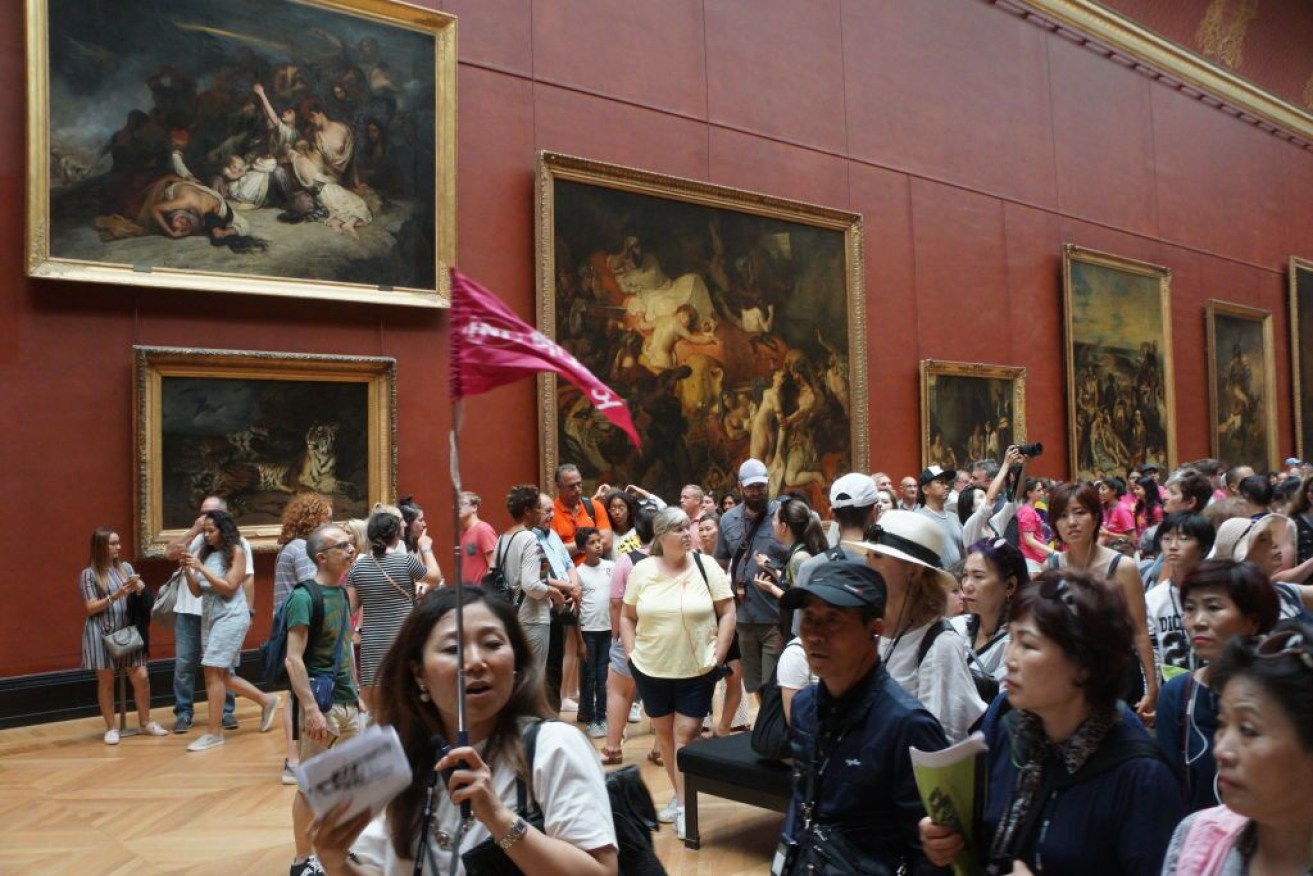Why so many of this growing group of tourists behave oddly


Chinese tourists among the crowds at the Louvre in Paris. Photo: Getty
A decade ago the future of Australia’s tourism industry looked bleak. Domestic travel had slumped 10 per cent over 12 months while international arrivals had also dropped, albeit marginally, for two consecutive years, according to tourism statistics.
The global financial crisis was partly to blame. Staunch competition from cheaper, emerging South-East Asian destinations also played a role, as did the introduction of the low-cost international airlines.
Australia looked old, stale, stuck in Crocodile Dundee land, while a series of ill-thought advertising campaigns – such as the Lara Bingle ‘where the bloody hell are you?’ debacle and Tourism Australia’s marriage to Baz Luhrmann’s terrible film Australia – seemed to rub salt into the wound.
But in 2012, things began to change, with a dramatic increase in arrivals that has continued every year since. Eight and a half million international tourists visited our country last year, with the figure projected to hit 10 million by 2021, according to Austrade.
The recovery is credited to one source country. More than 1.3 million Chinese holidayed in Australia in 2018, contributing $12 billion to our economy – one-quarter of the total international tourism spend.
The phenomenon is occurring all over the world: last year Chinese citizens made close to 150 million overseas trips. But the boom has been accompanied by criticism of their behaviour.
In 2014, a Chinese passenger on an AirAsia flight threw a cup of hot noodles into a flight attendant’s face after being told she couldn’t sit next to her boyfriend. In 2016, footage was posted on YouTube of Chinese tourists nearly climbing over each over in a mad rush to shovel prawns on their plates at a buffet in Thailand.
Dozens of Chinese tourists have been busted letting their kids urinate in subway stations and shopping centres in Hong Kong, while a handful have allowed their children to defecate in planes. A teenage boy from China even engraved his name on a 3500-year-old World Heritage-listed temple in Egypt: “Ding Jinhao was here.”

Graffiti scrawled on the 3500-year-old Luxor temple by a Chinese teenager. Photo: AAP
I experienced how badly some Chinese behave on a speedboat that connects Airlie Beach and Hamilton Island. When the seas got choppy, a Chinese woman sitting a few rows in front of me got sick, turned her head back towards me and puked. A glob of vomit landed on my arm but she didn’t say sorry. She didn’t even blink.
Are these anecdotes minority reports? Or is there something fundamentally wrong with the way Chinese tourists think?
Before I attempt to answer, it must be pointed out that Chinese tourists do not hold a monopoly on anti-social behaviour. In Thailand and India – two famously tolerant countries – some hoteliers and restaurateurs are so sick of Israeli backpackers that they put up signs barring them.
Australians, meanwhile, have a reputation for running amok in Bali. In August alone, a drunk Australian man went on a violent rampage, kicked a man off his motorbike and assaulted several other locals.
Another was sentenced for cooking up cocaine in his kitchen, an Australian Instagram model tried to smuggle 100 tablets of prescription methamphetamine through the airport while an Australian backpacker was busted snatching a bag from a young Canadian girl.
https://www.youtube.com/watch?v=nRWa9OUhhmM
And every day on the island, hundreds of unlicensed Australians ride motor scooters – then bitch about it on social media when they get into accidents.
But the proportion of Chinese holidaymakers who behave badly overseas is significantly higher than other nationalities and their antics are more deviant, notes Dr Antonio Graceffo, an American economist who’s spent seven years studying and teaching in China.
“It’s not just my opinion. There’s a tonne of data by tourism boards, travel services as well as governments that show Chinese tourists act terribly overseas,” Dr Graceffo said.
“The Chinese government now runs advertisements telling its people not to piss on the street in front of cathedrals in Europe or take off their shoes in hotel lobbies in New York.”
Wang Yang, once one of China’s four vice premiers, voiced similar sentiments.
“They make a racket in public places, carve words at scenic spots, cross the road when the light is red, spit and do other uncivilised things,” Mr Yang said in 2013.
“This is detrimental to the image of the country’s people and leaves a bad impression.”
Dr Graceffo explains the phenomenon like this: “If you ask Japanese why they are so polite and always wait in line and why they are so quiet, they will tell you it’s because their population is so large compared to the size of their country and that if everyone were simply to act as they pleased, Japan would be unliveable.
“If you were to ask Chinese people why they skip queues, why they are so loud and tend not to sit in the seats assigned to them on flights, they’ll say something similar. They’ll say their population is so large, if they were to stand in line and wait their turn, they’d never get anything. This shows how two different Asian cultures that faced the same problem of overcrowding handled it differently.
“I also believe many of these problems are caused by communism and the way it accustoms its subjects to ignoring the world around them.
“The vast majority of Chinese simply do not understand that other cultures are different from theirs or that they will offend people by acting the way they do.”

Chinese tourists in the streets of Rome, outside the Colosseum. Photo: Getty
Another reason, according to Dr Graceffo, is that 70 per cent of Chinese outbound tourists travel in group tours with Chinese guides, Chinese buses, Chinese food and Chinese drinks “where they learn nothing about cultures while travelling overseas”.
“Their behaviour may not change,” he said.
Right now only 9 per cent of the Chinese population – some 120 million people – hold passports. But according to the China Outbound Tourism Research Institute, that number will hit 400 million by 2030.
That means more than one in four of all international tourists will be Chinese within a decade and our tourism industry will be even more dependent on Chinese tourists.
If they won’t change, are we going to have to change our expectations?








